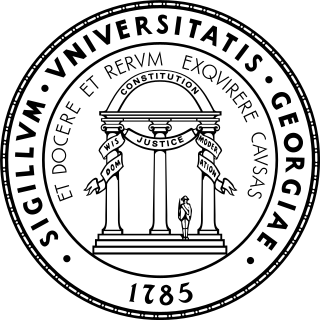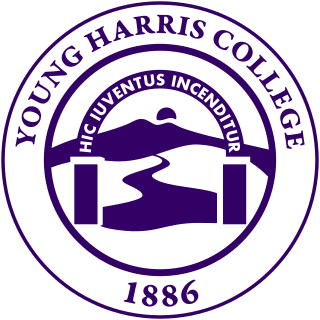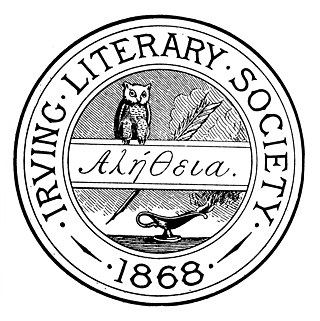
Debate is a process that involves formal discourse, discussion, and oral addresses on a particular topic or collection of topics, often with a moderator and an audience. In a debate, arguments are put forward for common opposing viewpoints. Debates have historically occurred in public meetings, academic institutions, debate halls, coffeehouses, competitions, and legislative assemblies. Debates have also been conducted for educational and recreational purposes, usually associated with educational establishments and debating societies. These debates emphasized logical consistency, factual accuracy, and emotional appeal to an audience. Modern forms of competitive debate also include rules for participants to discuss and decide upon the framework of the debates.

The American Whig–Cliosophic Society, sometimes abbreviated as Whig-Clio, is a political, literary, and debating society at Princeton University and the oldest debate union in the United States. Its precursors, the American Whig Society and the Cliosophic Society, were founded at Princeton in 1769 and 1765 by James Madison, William Paterson, Oliver Ellsworth, and Aaron Burr.

The University of Georgia is a public land-grant research university with its main campus in Athens, Georgia, United States. Chartered in 1785, it is one of the oldest public universities in the United States. It is the flagship school of the University System of Georgia.

The University of Georgia School of Law is the law school of the University of Georgia, a public research university in Athens, Georgia. It was founded in 1859, making it among the oldest American university law schools in continuous operation. Georgia Law accepted 14.77% of applicants for the class entering in 2023.
The Philomathean Society of the University of Pennsylvania is a collegiate literary society, the oldest student group at the university, and a claimant to the title of the oldest continuously-existing literary society in the United States, a claim disputed by Columbia University's Philolexian Society, which was established in 1802. Founded in 1813, its goal is "to promote the learning of its members and to increase the academic prestige of the University." Philomathean is derived from the Greek philomath, which means "a lover of learning." The motto of the Philomathean Society is Sic itur ad astra.

Young Harris College is a private Methodist-affiliated liberal arts college in Young Harris, Georgia, United States.

The Phi Kappa Literary Society is a college literary society, located at the University of Georgia in Athens, Georgia, and is one of the few active literary societies left in America. Originally founded in 1820, the society has disbanded several times and was and most recently refounded in 1991, remaining active since. It continues to hold regular meetings at Phi Kappa Hall on the University of Georgia's North Campus. The Phi Kappa Literary Society holds formal debates and a forum for creative writings and orations as well as poetry.

The Honor Society of Phi Kappa Phi is an honor society established in 1897 to recognize and encourage superior scholarship without restriction as to area of study, and to promote the "unity and democracy of education". It is the fourth academic society in the United States to be organized around recognizing academic excellence, and it is the oldest all-discipline honor society. The society's motto is Φιλοσοφία Kρατείτω Φωτῶν, which is translated as "Let the love of learning rule humanity", and its mission is "to recognize and promote academic excellence in all fields of higher education and to engage the community of scholars in service to others." It is a member of the Honor Society Caucus, which is composed of four honor societies: Phi Beta Kappa, Phi Kappa Phi, Sigma Xi, and Omicron Delta Kappa.

The Dialectic and Philanthropic Societies, Inc. commonly known as DiPhi or The Societies, are the original collegiate debating societies at the University of North Carolina at Chapel Hill, and together comprise the oldest student organization at the University, as well as the oldest public student organization in the United States. During the academic year, the Societies hold regular meetings at 7:30 PM on Mondays in the Dialectic Chamber at the top of the New West Building. The Societies also hold occasional social events in the Philanthropic Chamber at the top of New East Building.
The Euphemian Literary Society, founded in 1839, is the oldest student organization in South Carolina still operating under its original charter. Euphemian Hall is located in Due West, South Carolina, on the Erskine College campus. The Euphies are a literary society at Erskine College. The Euphies are chartered by the State of South Carolina.

Phi Alpha (ΦΑ) is a men's Literary Society founded in 1845 at Illinois College in Jacksonville, Illinois. It conducts business meetings, literary productions, and other activities in Beecher Hall, the oldest college building in the state of Illinois.

Nathaniel Edwin Harris was an American lawyer and politician, and the 61st Governor of Georgia.
Augustin Smith Clayton was a jurist and politician from the American state of Georgia.

The Philodemic Society is a student debating society at Georgetown University founded in 1830 by Father James Ryder, S.J. The Philodemic is among the oldest such societies in the United States, and is the oldest secular student organization at Georgetown. The society's motto, "Eloquentiam Libertati Devinctam" reminds its members that they are pursuing Eloquence in Defense of Liberty.
The Peithologian Society was an undergraduate debate society at Columbia University. It was founded in 1806, four years after Columbia's first literary society, the Philolexian Society, by freshmen who were disenfranchised by Philolexian's requirement that its members be upperclassmen. Its emphasis on debate, composition, and rhetoric was similar to Philo's literary aims, and the two societies shared other superficial characteristics as well. Philo adopted light blue as its official color, while Peithologian adopted white. Whereas Philolexian's symbol was a rising sun, Peithologian's was a star. Its Latin motto was "Vitam Impendere Vero" meaning, roughly, "To devote one's life to truth."
John A. Knox is a meteorologist who researches clear-air turbulence (CAT) and who also received media attention for discussing ways of calculating the mathematical constant e, together with inventor Harlan J. Brothers. He is a professor at the University of Georgia and has been nationally honored for his undergraduate teaching.
College literary societies in American higher education are a particular kind of social organization, distinct from literary societies generally, and they were often the precursors of college fraternities and sororities. In the period from the late 18th century to the Civil War, collegiate literary societies were an important part of campus social life. These societies are often called Latin literary societies because they typically have compound Latinate names.

The Irving Literary Society was a literary society at Cornell University active from 1868 to 1887. The U.S. Bureau of Education described it as a "purely literary society" following the "traditions of the old literary societies of Eastern universities." During the period when the Cornell literary societies flourished, the Irving and its peers produced literature at a rate higher than the campus average for the next generation, leading commentators at the turn of the 20th century to question whether academic standards had fallen since the university's founding. Named after the American writer Washington Irving, the Irving Literary Society was founded on October 20, 1868, shortly after Cornell opened. Past members who went on to prominent careers included Judge Morris Lyon Buchwalter, Senator Joseph Benson Foraker, and the journalists John Andrew Rea and Francis Whiting Halsey. The Irving's last public meeting was held on May 23, 1887. After that it ceased to exist as a Cornell University student society. However, the New York Alpha Chapter of the Phi Kappa Psi undergraduate fraternity at Cornell claims to have "served as steward of the Irving Literary Society since 1888".

Phi Delta Gamma (ΦΔΓ) was an American professional fraternity in the field of forensics. It merged into Tau Kappa Alpha in 1935.














